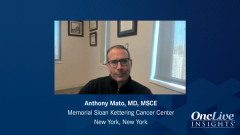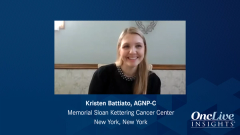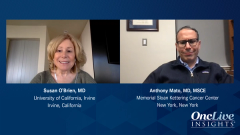
PI3K Inhibitors for Chronic Lymphocytic Leukemia
The rationale for investigating and using PI3K inhibitors to treat chronic lymphocytic leukemia.
Episodes in this series

Susan O’Brien, MD: We can talk about something else, there’s another new therapy probably coming early next year, which is a new PI3K inhibitor, umbralisib. That was combined in the UNITY-CLL trial with an anti-CD20 [monoclonal antibody] from the same company, TG Therapeutics [Inc], and that was ublituximab. That UNITY trial was presented at ASH [American Society of Hematology annual meeting] last year and has been published. That PI3K, antibody combination was significantly better than chlorambucil and obinutuzumab. That will likely lead to an FDA approval based on improved PFS [progression-free survival]. Do you have experience with that combination, Anthony, and what are your thoughts on that?
Anthony Mato, MD, MSCE: Yes, I do have experience with it. Interestingly, I’ve never given it as the U2 [ublituximab, umbralisib] combination without something added to it. I’ve given it to patients in combination with pembrolizumab on a trial. I’ve given it to patients in combination with either ibrutinib or venetoclax on a trial, but I’ve never given U2 [ublituximab, umbralisib] by itself. I think that it’s an active PI3K inhibitor. Certainly, it’s the only one that has even a potential to be approved as a frontline therapy. I think idelalisib and duvelisib have no chance at that at this particular time based on that there’s no study examining that question. What I’m grappling with a little in terms of how to interpret the UNITY-CLL data, particularly in the front-line setting is how to decide on a PI3K over the already excellent outcomes we have with ibrutinib, acalabrutinib, and venetoclax. For me, unless it’s some extreme circumstance where none of those agents were an option, the U2 [ublituximab, umbralisib] combination will still likely be a relapsed/refractory regimen for my patients.
Susan O’Brien, MD: I guess we should clarify that in that trial, there were both frontline and relapsed patients, and so we would expect the label to be both for frontline and relapsed. I certainly agree with you. I believe in the frontline setting, the median PFS was about 3 years, and that’s good, but it’s not as good as we’re getting with the BTK [Bruton tyrosine kinase] inhibitors or VEN-G [venetoclax and obinutuzumab]. So I also don’t see a clear role for that in the frontline setting and think we’re mostly talking about relapse.
Transcript edited for clarity.





































